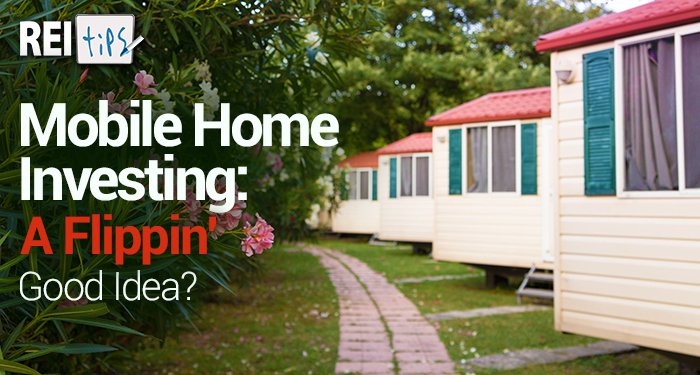“Nothing important was ever achieved without someone taking a chance.”
~H. Jackson Brown, Jr., author
But, like me, you might be curious as to why an investor would choose to flip mobile homes. Maybe there’s something we don’t know, right?
After all, the business would have to be lucrative… otherwise, why would anyone choose it?
So, after doing my research and chatting with some investors who are highly skilled in this area, I wanted to offer you some insight. Even if you decide that flipping mobile homes is definitely not your cup of tea, it can be helpful and interesting to learn about various property types and strategies that other investors pursue.
To start off, you should know that mobile homes tend to lose their value very quickly. As a result, flipping mobile homes is generally a higher-risk investment strategy than flipping what we call a stick-built (non-manufactured) home.
On that same note, increasing the value of a mobile home is also more difficult than improving the value of stick-built homes. Because you are limited in the improvements that can be made to a mobile home, you can only add so much value.
Plus, you need to take into consideration the park or land where the mobile home is located, which can significantly impact its value. Just like other homes, mobile home parks can vary from “desirable” to “avoid-at-all-costs.”
Still, with enough research—and a methodic approach—you can develop and implement a successful strategy for making significant profits from flipping mobile homes.
So, if I’ve piqued your interest, read on to discover some beneficial techniques and tips for flipping mobile homes. (I promise, it’s worth the read.)
Begin at the Beginning…
First, just a few words on understanding your ROI for flipping mobile homes…
Understand that—just like any property—flipping a mobile home requires a great deal of due diligence. Don’t dive headfirst into a deal until you’ve done your research. It’s especially important to understand the market trends in your neighborhood or city of choice.
The Good News: Mobile homes offer square footage prices that are a fraction of what they would be for non-manufactured homes. And, mobile homes can appreciate significantly in value if they are kept up (and especially if they are permanently installed).
And one final tip…
As you consider venturing into this area of investing, you may also want to seriously consider living in the mobile homes while you flip them (if this would work for your life/family). By doing so, you can save a ton of dough, and make a more significant profit.
Doing Your Due Diligence
You might be eager to get started, but you’ll want to spend plenty of time preparing for your investment.
Before you buy, consider these tips:
 Know your stuff – Spend time browsing Craigslist, online ads and even printed classified ads for mobile homes for sale in your market. Build your knowledge! The more you read these, the more quickly you’ll begin to see patterns in pricing, which means you’ll be able to easily spot a good deal when it pops up.
Know your stuff – Spend time browsing Craigslist, online ads and even printed classified ads for mobile homes for sale in your market. Build your knowledge! The more you read these, the more quickly you’ll begin to see patterns in pricing, which means you’ll be able to easily spot a good deal when it pops up. Make connections – It can be extremely beneficial to establish a relationship with the managers of local mobile home parks. These individuals will know when someone is looking to sell. If you’re a trusted connection, you could be one of the first people the manager calls with a property deal lead.
Make connections – It can be extremely beneficial to establish a relationship with the managers of local mobile home parks. These individuals will know when someone is looking to sell. If you’re a trusted connection, you could be one of the first people the manager calls with a property deal lead. Practice your bidding – Property auctions are often grossly underrated by the investing community. Attend auctions to learn more about the mobile home prices in your area. Just make sure that you never purchase a home sight-unseen. This is NOT a good idea, especially in the case of foreclosed mobile home (which can be damaged beyond any feasible repair).
Practice your bidding – Property auctions are often grossly underrated by the investing community. Attend auctions to learn more about the mobile home prices in your area. Just make sure that you never purchase a home sight-unseen. This is NOT a good idea, especially in the case of foreclosed mobile home (which can be damaged beyond any feasible repair). Look around – On that same note, make sure you inspect a mobile home thoroughly before committing to any purchase contract. In most cases, any structural damage will ruin your chance of making a decent profit. So, look for homes that require basic cosmetic updates but are structurally sound.
Look around – On that same note, make sure you inspect a mobile home thoroughly before committing to any purchase contract. In most cases, any structural damage will ruin your chance of making a decent profit. So, look for homes that require basic cosmetic updates but are structurally sound. Consider the property’s age – You’d think that investing in a fairly new mobile home would be a better idea, but – usually – this isn’t the case. Mobile homes depreciate in value dramatically in their first 5 years of existence; after that, the values tend to even out. So, take this into consideration as you look for properties.
Consider the property’s age – You’d think that investing in a fairly new mobile home would be a better idea, but – usually – this isn’t the case. Mobile homes depreciate in value dramatically in their first 5 years of existence; after that, the values tend to even out. So, take this into consideration as you look for properties.
Once you’ve scored an awesome deal on a mobile home, you’ll be ready for the fun stuff…
Rehabbing Like a Boss
When it comes to renovating a mobile home, you’ve got to stick to the budget.
I repeat: Stick. To. The. Budget.
Whatever budget you determine, prior to starting repairs or renovations, don’t exceed it.
Because you’re working on a property that isn’t stick-built, it’s unlikely that exceeding your pre-determined budget would be wise.
It’s also important to do as much of the work yourself (if you can). This will save a boatload of money.
Word of Caution: Make sure you hire a professional to complete any work that’s more specialized. Understanding the balance between “I can do this myself” and “Heck no, I need an expert for that” is essential.
Now, if you’re accustomed to investing in traditional, stick-built properties, your automatic instinct will tell you that higher-quality materials and appliances will add BIG value to your mobile home.
But, in most cases, this isn’t true.
The value of most mobile homes won’t increase much with higher-quality materials. Because this isn’t a permanent property, it’s best to stay with the basics and avoid the high-end stuff.
Really, your main goal is to improve the cosmetic appeal of the mobile home. So, consider these smart, cost-effective options:
 Wash and repair siding
Wash and repair siding Clean or replace carpeting
Clean or replace carpeting Paint walls and ceilings
Paint walls and ceilings Install basic, laminate flooring
Install basic, laminate flooring Replace doors that are in poor condition
Replace doors that are in poor condition Make cost-effective updates to countertops
Make cost-effective updates to countertops Switch out the cabinetry hardware
Switch out the cabinetry hardware Install new, updated light switches, outlet and vent covers, etc.
Install new, updated light switches, outlet and vent covers, etc. Re-glaze bathtubs and sinks
Re-glaze bathtubs and sinks Make minor repairs to the roof
Make minor repairs to the roof
This will give you enough for a basic, cosmetic rehab. If you have any major items that need repairing (such as plumbing, electrical, HVAC, etc.), calculate those costs separately. (And, if at all possible, avoid investing in mobile homes that require those major repairs, in the first place.)
Once you’re satisfied with your rehab work, you’ll be ready for next steps.
Finding Your Ideal Buyer
If you’re planning to list your newly flipped mobile home, it’s important to come up with a conservative asking price.
This is NOT the time to get overly ambitious with the listing price. As I mentioned before, you can only increase the value of a mobile home so much. If you’re asking an outrageous price, buyers will avoid your listing and opt for a brand-new mobile home (which won’t cost much more).
Your target buyers will be:
 people who are on a budget
people who are on a budget first-time homebuyers
first-time homebuyers those who want to downsize from their current home
those who want to downsize from their current home
Instead, look for buyers who are working-class, financially responsible individuals and who haven’t yet had the income level needed to stop renting and buy a traditional home. Many of these folks would be happy to own their own mobile house, rather than continuing to throw their money at a landlord every month.
If you decide to accept monthly payments from an interested buyer, you will likely find several worthy candidates who are willing to pay your full asking price (if not more) for a newly renovated mobile home.
Structuring a fair repayment plan will allow you to choose from a variety of qualified buyers, rather than struggling to find an all-cash buyer. And, as we all know, more buyers equals a faster sale.
To determine how much to charge, consider comparable apartment rent prices…
For instance, if a mostly updated, nearby 3 bed/2 bath apartment rents for $1,000/month, you’ll want to charge anywhere from $900 to $1,100 (which includes lot rent) for your mobile home.
The pricing is crucial.
If you’re selling the mobile home for a monthly payment that’s comparable to apartment rent prices in your market, you’ll create an attractive and enticing option for people who are eager to buy.
Bringin’ it Home
I would be remiss if I didn’t mention that one of the most important parts of this entire process is overcoming the stereotypes and stigmas associated with mobile homes.
While mobile home parks are often given a bad rap, the reality is: there are many parks throughout the country that are respectable (and even desirable) places that working-class, retired or traveling individuals love to be.
Regardless of whether you invest in stick-built homes, mobile homes or a combination of the two, understanding your local market is KEY.
When it comes down to it, flipping mobile homes can be a smart way to make money and build your business as an investor. If you are informed, prepared and willing to work hard, you can make this a very profitable venture.
Going Mobile
Have you flipped a mobile home (or know of an investor who did)? What challenges and rewards did you (or they) experience?




